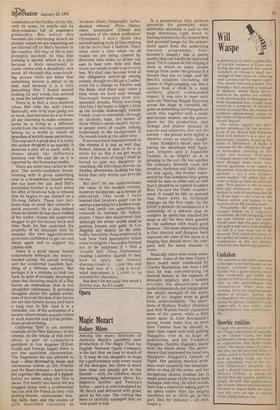Magic Mozart
Rodney Mines
Among the many felicities of Anthony Besch's excellent new production of The Magic Flute for English National Opera Company is the fact that we hear so much of it. It may be too idealistic to hope for a performance with every word of the dialogue, but there is more here than you usually get in the theatre — with, for instance, much interesting information about Papageno's mother and Pamina's father — and it is well translated by Mr I3esch and delivered with great spirit by his cast. The cutting has been so tactfully managed that no vital point is lost.
In a presentation that eschews gimmicks for gimmicks' sake, admirable attention is paid to the stage directions, right down to flaming helmets for the Armed Men arid pyramid lamps for the priests. Quite apart from the underlying masonic programme, Schikaneder's imagery has a poetic quality that can hardly be improved upon. Yet it cannot be fun staging a work in which so many people emerge from under the ground in a theatre that has no traps, and Mr Besch's solutions (including the Queen of Night popping out like a cuckoo from a clock in a most unlikely place) commanded respect. It was nice to meet once more his Thieving Magpie fluttering across the stage in colourful disguise as something for Papageno to catch: this, together with a really spectacular serpent, set the atmosphere for the production, that strange and elusive mixture of naivete and solemnity (but not too solemn — the priests were rightly a cheerful crew) so exactly caught.
John Stoddart's decor, also following the directions with Egyptian temples and a Japanese Tamino, is as helpful as it is pleasing to the eye. He too catches the contrasts, between vault and meadow, darkness and light, clau stro and agora, the former represented by that luminous blue-green which he uses so often and so well that it should be re-named Stoddart Blue: I'm sure the Turks wouldn't mind. It would be idle to pretend that there were no technical mishaps on the first night (in the ENOC's present circumstances it is something of a miracle that so complex an opera has reached the stage at all) but they were greeted by the audience with much good humour. The most important thing is that director and designer have captured the tone of the piece in a staging that should serve the company well for many seasons to come.
Musically there were some uneasinesses. Some of the best Flutes I have heard were conducted by Charles Mackerras, but here I felt that he was concentrating on musical beauty at the expense of dramatic urgency, and I wonder whether his decorations and embellishments do not compromise the simple strength of the score. Few of the singers were in good form, understandably. The intentions of Barbara Walker (Pamina) and Neil Warren-Smith (Sarastro) were of the purest, while a little more spine in John Brecknock's acting would make him an even finer Tamino than he already S. Alan Opie coped well with putting Papageno over in so huge an auditorium, and his Yorkshire Papagena (Sandra Dugdale) nearly stole the whole show. The performance that impressed me most was Margaret Haggart's Queen of Night. Her passing musical problems were caused by her determin ation to sing all the notes, and her exceptional diction enabled her to
make good sense of the role in both dialogue and song. In other words, here was a character taking part in an opera rather than the singing machines we so often get in this part, like, for instance — oh well, forget it.


























 Previous page
Previous page